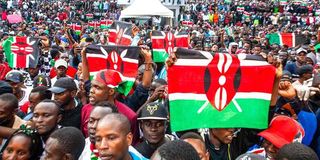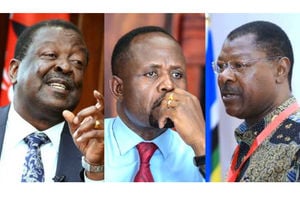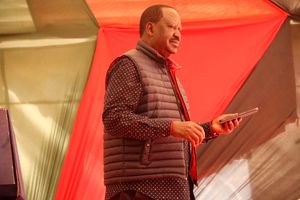
Participants during the Shujaaz Memorial concert held on July 7, 2024 at Uhuru Park in Nairobi.
The scramble to cash in on the Gen Z wave moved into top gear as the Office of the Registrar of Political Parties has received more than 20 applications for name reservations in preparation for the 2027 polls.
The dash to ride on the popular wave created by young people agitating for good governance in the country has seen the Registrar’s office receive an unusually high number of applications for the reservation of names by political players.
The latest development comes at a time when youthful eligible voters have begun showing keen interest in the affairs of the country, unlike in the past when many of them lost faith and kept off political issues.
The Registrar of Political Parties, Ann Nderitu, said the rush to reserve names began the day after the first demonstration was held last month when at least 20 applications were handled in a span of less than a month.
However, she explained that none of the applications, starting with the words Gen Z, have been accepted as they violate the law, especially Article 91(1)(a)(e) of the Constitution on basic requirements for political parties.
The law requires that political parties have a national character as well as respect for the rights of all persons to participate in the political process, including minorities and marginalised groups.
Reserving names
“Over 20 applications have been made. Some people started reserving names on the first day after the first demonstration was held. However, we have not reserved any name starting with Gen Z because that would be violating the Constitution,” said Ms Nderitu.
She pointed out that the reason for rejecting the names is based on the law as Article 91 requires a political party to have a national character and be inclusive.
“We need to see all the different groups of the population accommodated in a party. The minute you say Gen Z party then you are excluding the rest of the people,” said the Registrar.
“When you exclude others then that party does not have a national outlook. Just like the youth don’t want to be excluded, they should also not be allowed to exclude others. Everyone should be brought on board. So we need to have a name that is inclusive right from the onset.”
One such application by Simon Maina Mwangi was rejected by Ms Nderitu on the basis of the above-mentioned article of the Constitution.
Mr Mwangi wanted 10 names reserved by the Registrar including Gen-Z Movement, Gen Z National Movement, Gen Z People’s Alliance, Gen Z Peoples Movement, Gen Democratic Party, Gen Z Alliance Movement, Gen Z Democratic Movement, Gen Z United Movement, Gen Z Political Party and Gen Z Alliance Party. Nonetheless, Ms Nderitu rejected the application in a letter dated July 11, 2024.
Another application by John Onyango Ogenga made on June 24, to have the name Gen-Z party reserved, was equally rejected on similar grounds.
Mr Ogenga has since moved to the Political Parties Tribunal to appeal the decision, terming the rejection of the reservation application as unconstitutional, premature, discriminatory and a violation of his political rights.
Mr Mwangi has also vowed to challenge the decision arguing the reason cited does not hold water citing the example of the Farmers Party, which was registered although not every Kenyan is a farmer.
“I just wanted the Gen Z to have a structure where we can address our issues as well as identify ourselves with. People have been calling us terrorists or formless and so we need a structure that is legally registered for easy identification of our members,” said the 32-year-old Technical University of Kenya alumnus.
Ms Nderitu, however, said she is yet to be served with any letter of any court proceedings against her office over the rejections.
“We are just seeing the reports on social media. They are over 20 and so I don’t know who wants to take us to court,” she said.
She said the country has 90 political parties as of the 2022 General Election but there are at least 15 which are in the pipeline and are being processed.
“We have not registered any new ones since 2022. However, more than 100 name reservations have been made only that people do not follow up,” said Ms Nderitu.
“They come to reserve the name and the symbol and also bring a condition but when we return the condition to them for amendment, they disappear. They take forever to get back,” she said.
Determined to pass a message to the government, the fed-up millennials and Gen Z, who are expected to make up the biggest chunk of voters in the 2027 polls, are now increasingly getting involved in the political discourse in the country unlike in the past.
The number of registered voters in the last elections rose from 19.6 million to 22.12 million from 25.21 million eligible voters as per the Kenya National Bureau of Statistics.
The youth, aged between 18 and 34 years, stood at 39.84 percent of the registered voters, representing 7.7 million voters.
Kenya is considered a country of the youth, with those under 35 years comprising 75 percent of the country’s 47.6 million population, according to the 2019 population and housing census, setting the stage for a bruising battle with the youth, who will form a significant chunk of voters in the 2027 elections.
But the rejection of name reservations seeking to ride on a popular wave is not new as Ms Nderitu in May this year declined more than 50 attempts to register Tawe movement, associated with Trans Nzoia Governor George Natembeya, as a political party on the grounds of not meeting requirements of Section 8 of the Political Parties Act, 2011, saying the term is “offensive and would cause confusion”.
In March last year, the Registrar declined the application to register a rival ODM Party, citing failure to meet the requirements of Section 8 of the Political Parties Act.
The application was made by ex-Kisumu CEC Thomas Ondijo Owitti, who had suggested three names for the party – ODM Asili, ODM Mpya, and ODM Kamili.
Four years ago an attempt to register Jubilee Asili by James Simiyu was blocked as it violated Article 91.









